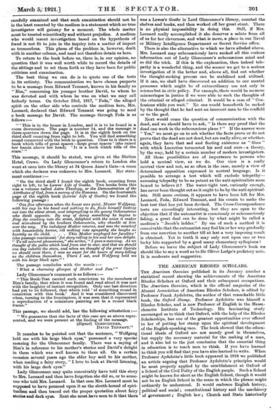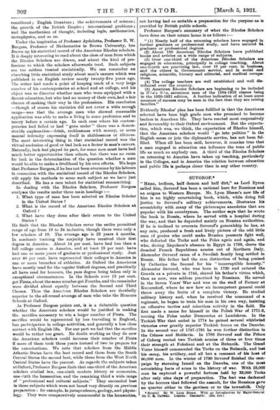THE AMERICAN RHODES SCHOLARS.
THE American Oxonian published in its January number a statistical record showing the achievements of the American Rhodes Scholars at Oxford and their subsequent occupations. The American Oxonian, which is the official magazine of the Alumni Association of American Rhodes Scholars, is edited by Professor Frank Aydelotte, the author of that remarkable little book, the Oxford Stamp. Professor Aydelotto was himself a Rhodes Scholar, and is now Professor of English in the Massa- chusetts Institute of Technology. His fascinating study encouraged us to think that Oxford, with the help of the Rhodes Scholarships, has one of the greatest opportunities ever offered to her of putting her stamp upon the spiritual development of the English-speaking race. The book showed that the educa- tional ideals of Oxford are not merely good in themselves, but supply the necessary material for the making of a man, and it also led to the just conclusion that the essential thing in education is to teach men to think. If you have learned to think you will find that you have also learned to write. When Professor Aydelotte's little book appeared in 1918 we published an article arguing that Professor Aydelotte's principles would be most properly applied by the establishment at Oxford of a School of the Civil Polity of the English people. Such a School might be known for short as the English School, though it would not be an English School in the sense in which the phrase might ordinarily be understood. It would embrace English history, political and social ; constitutional history and the machinery of government ; English law ; Church and State historically
considered ; English literature ; the achievements of science ; the growth of the British Empire ; international problems ; and the mechanism of thought, including login, mathematics, metaphysics, and so on.
Under the inspiration of Professor Aydelotte, Professor R. W. Burgess, Professor of Mathematics in Brown University, has drawn up his statistical record of the American Rhodes scholars. It is deeply interesting to read about the class of men from which the Rhodes Scholars are drawn, and about the kind of pro- fessions to which the scholars afterwards tend. Such subjects are too seldom treated statistically. We can remember an absorbing little statistical study about men's careers which was published in an English review nearly twenty-five years ago. The writer had made a point of keeping track of a very large number of his contemporaries at school and at college, and his object was to discover whether men who were equipped with a decent education, but who had no money of their own, had a fair chance of making their way in the professions. His conclusion —though of course his statistics did not cover a wide enough range—was that the average man who showed reasonable application was able to make a living in some profession and to marry before a certain age. In each case where his contem- poraries had failed or had " gone under " there was a demon- strable explanation—drink, recklessness with money, or some mental infirmity expressing itself in shiftlessness or idleness. The most interesting thing in that statistical record was the virtual exclusion of good or bad luck as a factor in men's careers. Naturally, luck had played its part, for some men must have had much better opportunities than others, but there was no room for luck in the determination of the question whether a man would be able to make a livelihood by his own efforts. We hope that Professor Burgess, if he has not been overcome by his labours in connexion with the statistical record of the Rhodes Scholars, will apply his methods to some such subject as we have just described. He has a rare talent for statistical summarizing.
In dealing with the Rhodes Scholars, Professor Burgess analyses the results under three main headings :- 1. What type of man has been selected as Rhodes Scholar in the United States 1 2. What is the record of the American Rhodes Scholars at Oxford ?
3. What have they done after their return to the United States ?
He finds that the Rhodes Scholars cover the entire permitted range of age from 19 to 24 inclusive, though there were only a few scholars of 19. The average age is 22 years 4 months. In academic training the majority have received their first degree in America. About 14 per cent. have had less than a full college course in America, and at least 19 per cent. have had one or more years of graduate or professional study. Just over 40 per cent. have represented their colleges in America in one or more branches of athletics. At Oxford the Americans have mostly read for the regular Oxford degrees, and practically all have read for honours, the pass degree being taken only in exceptional circumstances. In the Schools over 13 per cent. got Firsts, about the same number got Fourths, and the remainder were divided about equally between the Second and Third Classes. Thus the American Rhodes Scholars are decidedly superior to the all-round average of men who take the Honours Schools at Oxford.
As Professor Burgess points out, it is a debatable question whether the American scholars would be justified in making the sacrifice necessary to win a larger number of Firsts. The sacrifice would be represented by less travelling in England, less participation in college activities, and generally a less close contact with English life. For our part we feel that the sacrifice would be rather too great. No doubt working as they do now the American scholars could increase their number of Firsts if more of them took three years instead of two to prepare for the examinations. We note that scholars from the Middle Atlantic States have the best record and those from the South Central States the second best, while those from the West North Central States have the poorest. As regards the subjects taken at Oxford, Professor Burgess finds that one-third of the American scholars studied law, one-sixth modern history or economics, one-sixth the humanities, and the remaining third a wide range of " professional and cultural subjects." They succeeded beet in those subjects which were not based very directly on previous preparation : for example, in jurisprudence, geology, and physio- logy. They were comparatively unsuccessful in the humanities, not having had so suitable a preparation for the purpose as is provided by British public schools.
Professor Burgess's summary of what the Rhodes Scholars have done on their return home is as follows :-
" (1) Nearly half of the returning scholars have engaged in further graduate or professional study, and have secured 84 graduate or professional degrees.
(2) About 100 American Rhodes Scholars have published books and articles on a wide range of subjects.
(3) Over one-third of the American Rhodes Scholars are engaged in education, principally in college teaching. About one-fourth are practising law, over 10 per cent. in business, and the others in Government service, and in social and religious, scientific', literary and editorial, and medical occupa- tions.
(4) The college teachers are well established and well dis- tributed over the country. (5) American Rhodes Scholars are beginning to be included in WT o's IY7o, seventeen men of the 1904-1910 classes being in the 1920-1921 edition. A further indication of at least some measure of success may be seen in the fact that they are raising families."
Evidently Rhodes' plan has been fulfilled in that the Americans selected have been high grade men who promised to become leaders in American life. They have reacted most responsively and favourably to their Oxford environment. But the expecta- tion, which was, we think, the expectation of Rhodes himself, that the American scholars would " go into politics " in the English sense or join the diplomatic service, has not been ful- filled. When all has been said, however, it remains true that a man engaged in education can influence the tone of public life as much as anybody can. A third of the Rhodes Scholars on returning to America have taken up teaching, particularly in the Colleges, and in America the relation between education and public life is perhaps closer than in any other country.



































 Previous page
Previous page